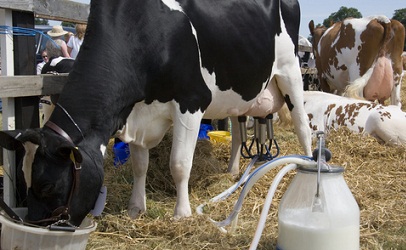A committee hearing is set today in the Virginia legislature on a House bill that would clarify the state’s raw milk herd share law, according to the sponsor.
Republican Barry Knight of Virginia Beach introduced HB-825 on Jan. 9. A similar bill in the Virginia Senate, introduced by Republican Mark Obenshain of Harrisonburg, died on Thursday when a 7-8 vote failed to advance it out of committee.
 The state does not allow the sale of raw, or unpasteurized, milk. However, it does allow dairy farmers to sell shares in a cow or a herd to individuals. The individuals who own shares are allowed to receive raw milk, but they cannot sell or distribute it to others.
The state does not allow the sale of raw, or unpasteurized, milk. However, it does allow dairy farmers to sell shares in a cow or a herd to individuals. The individuals who own shares are allowed to receive raw milk, but they cannot sell or distribute it to others.
Knight’s bill that is on the hearing calendar today for the House Committee on Agriculture, Chesapeake and Natural Resources would require that herd share agreements are in writing. It would also require that dairy owners file the agreements with the state.
In addition, the Republican’s bill includes reporting requirements for anyone involved in a herd share agreement — or any physician — who becomes aware of an illness related to the consumption of raw milk. The illnesses would have to be reported to local health departments as well as the state’s agriculture commissioner.
The bill would mandate that illnesses be investigated. It would give state officials the right to have free access to any location relevant to such investigations.
Also, owners of shares would assume “joint liability associated with the milking herd and any milk produced by such herd and stored, or packaged, at the farm…” They would also be required to acknowledge “the inherent dangers of consuming unpasteurized milk that may contain bacteria, such as Brucella, Campylobacter, Listeria, Salmonella, and E. coli; that has not been pasteurized to remove bacteria; and that is particularly dangerous to children, pregnant women, and those with compromised immunity.”
Dairy operators would have to label all raw milk distributed to shareholders with the dairy’s name, address and contact information. The raw milk labels would also have to include a consumer advisory indicating the danger of consuming unpasteurized animal-derived foods that have not been processed to remove pathogens.
The Virginia Department of Health, as well as other local and state health departments across the country, the U.S. Food and Drug Administration and the Centers for Disease Control and Prevention all warn against consuming unpasteurized milk or products made with it.
(To sign up for a free subscription to Food Safety News, click here.)
